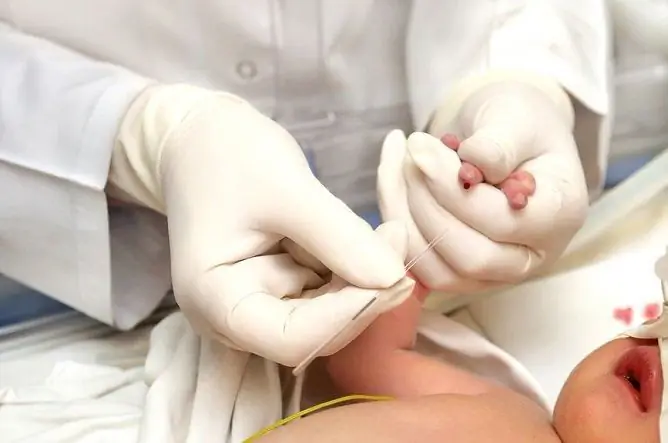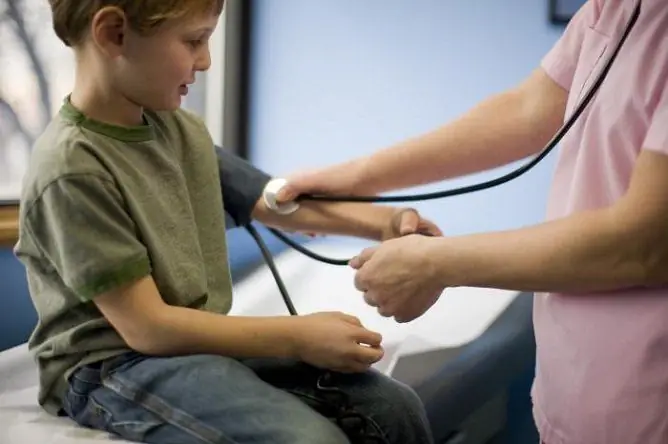- Author Rachel Wainwright wainwright@abchealthonline.com.
- Public 2023-12-15 07:39.
- Last modified 2025-11-02 20:14.
Medicines for children under 1 year old for cough: syrup for babies
The content of the article:
- What cough syrups can children under one year old
- Caring for a coughing baby
- Causes of cough in children under 1 year old
- Video
Cough syrup for children under 1 year old is the most popular dosage form. The assortment of syrups is wide enough, but not all of them are suitable for children of the first year of life.
Medicines in the form of a syrup are conveniently dispensed, many of them come with a measuring spoon and / or a measuring cup, they are convenient to give to infants, unlike tablet forms, so you can prescribe cough syrups from birth.
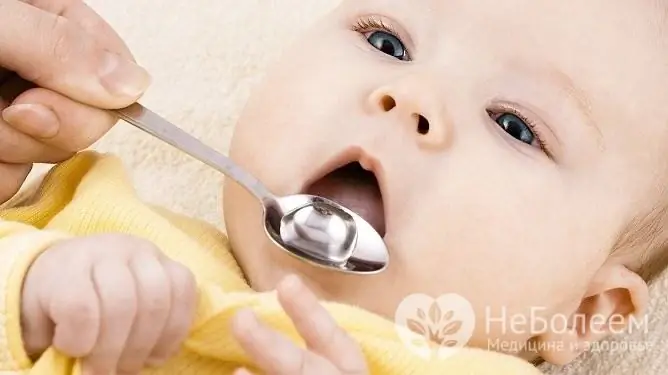
Syrup is the most convenient form of cough medicine for infants
It should be borne in mind that even the most effective drug can do more harm than good if used uncontrollably or in the treatment of diseases for which it is not suitable. Children of the first year of life are a special category of patients, very vulnerable. When choosing medicines for them, many parameters must be taken into account, therefore, this must be done exclusively by the attending physician. If a child has a cough, it is necessary to consult a doctor who, after examination, will prescribe a good, and at the request of the parents, also an inexpensive syrup, which is best suited in each case.
When choosing drugs, you need to know that drugs with a similar, and sometimes with the same composition can be produced under different brands and have different prices.
What cough syrups can children under one year old
Cough syrups differ in their mechanism of action. With a wet cough, mucolytics and expectorants are prescribed, with a dry cough - expectorant or antitussive, depending on the disease.
Mucolytic drugs reduce the viscosity of sputum, promote the early transition from an unproductive cough to a productive one. Most often, mucolytics are used for tracheitis, bronchitis, pneumonia and other diseases to thin and remove thick mucus from the respiratory tract. They should not be used in conjunction with antitussive drugs. Mucolytic agents that can be used as early as 1 month of life include Ambroxol, Ambrobene, Lazolvan, in which ambroxol hydrochloride is the active ingredient. Unless otherwise indicated by the doctor, they are taken 2 times a day, 0.5 teaspoon (2.5 ml), the duration of treatment depends on the course of the disease and is determined individually.
Expectorant cough syrups for newborns and infants are prescribed to thin phlegm and facilitate its removal from the body. The most common drugs in this group, recommended for the treatment of children in the first year of life, include Prospan and Bronchicum - they are usually recommended to be given to babies 2 times a day, as well as drugs based on licorice root extract, which can be used up to 3 times a day.
For wet coughing in children, the drugs Prospan, Linkas, Gedelix, Evkabal, Licorice Syrup, Lazolvan, Ambrobene or Flavamed are used. With a dry cough, the drug Stopussin can be used. It is prescribed for children from 6 months of age, while taking into account the weight of the patient.
The action of antitussive syrups is aimed at inhibiting the cough reflex, but they are usually not prescribed to children under 2-3 years of age. There may be exceptions, but they are established by the attending physician on an individual basis.
Also, children under 1 year old can be prescribed combination drugs. So, in pediatric practice, Linkas cough syrup is often used based on medicinal plants, which has an expectorant, anti-inflammatory, mucolytic, antispasmodic, antipyretic effect and is approved for use in children from 6 months. Combined drugs that are used for coughs and colds include Bronchipret syrup, which can be prescribed to children from 3-4 months.
Depending on the composition, there are three types of cough syrups:
- plant-based - they usually include licorice root, ivy, plantain, thyme, thyme, etc.;
- synthetic medicines - contain chemicals that help get rid of coughs, are most effective;
- combined (semi-synthetic) drugs.
Many cough syrups contain no sugar, but there are sweeteners. According to doctors, herbal medicines are best suited as cough syrups for babies, and although they have the mildest effect, it is sufficient in most cases.
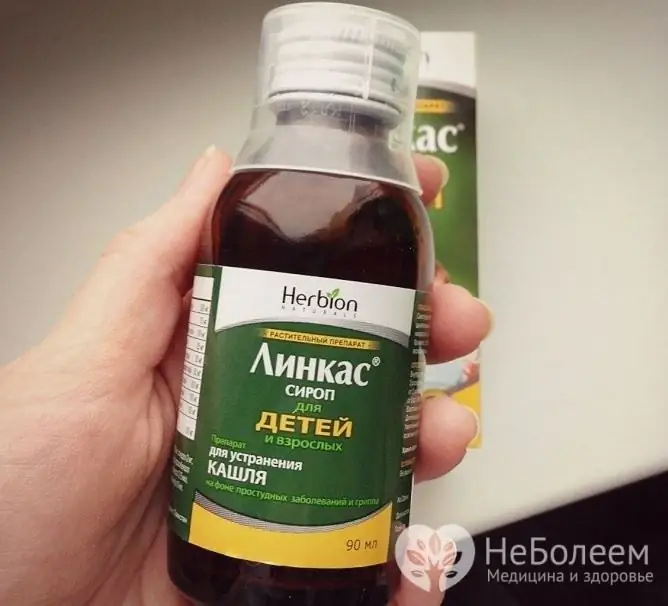
Linkas is a popular cough syrup that can be used in children under one year old.
Most pediatric cough syrups are recommended to be taken 3 times daily after meals. Before use, the medicine bottle must be shaken a little, and then poured into a measuring spoon and given to the patient. Some syrups can be mixed into the contents of a bottle with a nipple and so given to the baby.
Contraindications to the use of cough syrup can be diseases of the gastrointestinal tract, individual intolerance to the components of the drug, diabetes mellitus, as well as too early age of the patient.
We note again: when coughing in infants, you should not use any medications without first consulting a doctor. Syrups are selected strictly on an individual basis, depending on the cause and characteristics of the cough, the presence of contraindications, the age and weight of the child. Attempts to self-treatment can lead to the onset of edema of the respiratory tract, the transition of the disease to a chronic form, a deterioration in the patient's general condition, and the development of complications.
Absolutely safe medicines do not exist, in case of individual intolerance, any of them can cause unwanted reactions from the body. Therefore, when using drugs, you should carefully monitor the child's condition. If suspicious symptoms occur (for example, hives, changes in behavior, etc.), you should stop taking the syrup and immediately report the problem to your doctor.
Caring for a coughing baby
Treatment of many diseases of the respiratory tract in children at an early age is carried out in a hospital setting. However, in some cases, with an uncomplicated course of the disease, treatment can be carried out at home under the supervision of a pediatrician.
It is very important for successful treatment to follow the recommendations for caring for children with diseases of the respiratory system.
Indoor microclimate. In accordance with the recommendations of Dr. Komarovsky, the air temperature in the room where the patient is located should be 20-22 ° C. Higher temperatures favor the reproduction of pathogenic microorganisms, in addition, they cause the mucous membranes of the respiratory system to dry out. And lower ones can lead to hypothermia of the body. The humidity in the room where the sick child is located should be 60-70%. Lower values can cause the mucous membranes of the respiratory tract to dry out, while higher values promote the growth of microorganisms.
The room must be wet cleaned daily.
A constant supply of fresh air is required. If the child does not have a fever, it is allowed to go for a walk with him. If it's cold outside, the walk can still take place, but it can be short - 10-30 minutes.
The child must be adequately dressed - not only hypothermia, but also overheating is harmful.
When taking antitussives, it is necessary to strengthen the drinking regimen - this stimulates the production of sputum and facilitates its excretion, and in addition, helps to reduce intoxication. You can drink a child with any drinks intended for children of this age.
Causes of cough in children under 1 year old
Cough is a protective reaction of the body to the action of physical, chemical, organic irritants. The cough can be acute or chronic (lasts more than 2 months). Also, dry and wet (wet) coughs are distinguished.
A dry cough in a child can occur if it is impossible to evacuate viscous sputum. In young children, this cough can result in vomiting, which will lead to overstrain of the larynx. Dry cough in infants can occur during feeding, if the child chokes, during teething, which is accompanied by increased salivation. Coughing in infants can also occur due to drying out of the mucous membranes of the respiratory tract. With the addition of a secondary infection, an infectious and inflammatory disease of the respiratory tract can develop, which can also be accompanied by a cough.
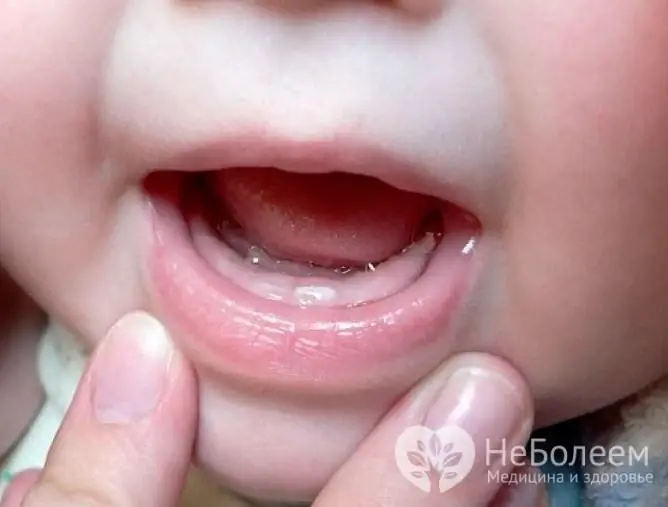
The cause of a baby's cough may be teething, in which case he does not need any cough medicine
Cough in children of the first year of life can appear with the development of inflammatory diseases of the nasopharynx. Other symptoms may be absent, in some cases the cough is accompanied by nasal congestion, fever, redness of the eyes, throat, inflammation of the tonsils, etc.
The most common reasons for hospitalization of children in the first year of life is bronchiolitis, which is characterized by blockage of bronchioles. With this disease, a wet cough is usually noted. Pathology can occur against the background of an acute respiratory infection, is its complication and requires the closest medical attention. Moist chest cough is observed in children with bronchitis.
A cough with difficult sputum may be accompanied by heavy breathing, and wheezing is heard in the child. Such a cough corresponds to diagnoses of tracheitis, bronchitis, chronic obstructive pulmonary disease, pneumonia, lung abscess, bronchial asthma, bronchiectasis.
Timely treatment of cough in children of the first year of life is of no small importance, since in the absence of such a rapid progression of the disease and its transition to a more severe form can be noted, therefore, when it appears, you should immediately consult a doctor.
Video
We offer for viewing a video on the topic of the article.

Anna Aksenova Medical journalist About the author
Education: 2004-2007 "First Kiev Medical College" specialty "Laboratory Diagnostics".
Found a mistake in the text? Select it and press Ctrl + Enter.


